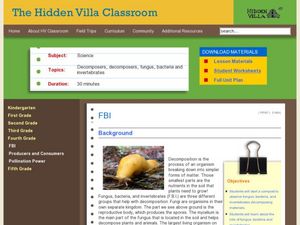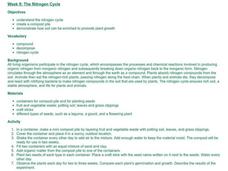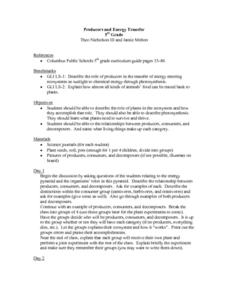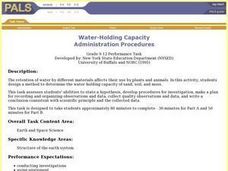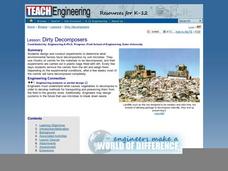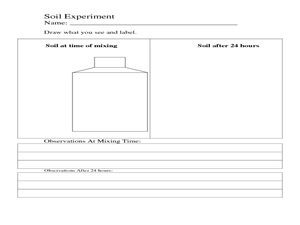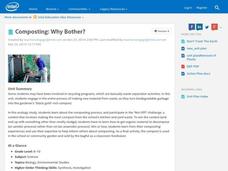Science Matters
Crawly Composters
Get your hands dirty with an interactive instructional activity that showcases the process of decomposing and returning nutrients back into the soil. After building a compost pile, pupils regularly observe the...
Curated OER
Selecting Soil Organisms in Compost
Young scholars conduct an experiment to demonstrate that many of the enzyme systems needed to break down society's wastes exist in nature among the decomposers in a compost pile. They culture compost bacteria on starch agar to examine...
Curated OER
Helping the Soil
In this soil conservation worksheet, students study and analyze two excellent ways to enhance soil conservation: compost heap and leaf-mould. Students review all the ingredients in making both.
Curated OER
FBI
Fourth graders experiment with compost. In this Science lesson, 4th graders begin a worm compost as well as an outdoor compost. Students discuss decomposition.
Curated OER
Cycling of Matter and Energy
These twenty various types of questions related to the cycling of matter and energy require students to match each definition in column 1 with the correct vocabulary term from column 2. Then, students explain what is being demonstrated...
Alabama Wildlife Federation
Forest Floor Investigation
Most living things go unnoticed. Change that using a fun activity about the nutrient cycle. Pupils use hula hoops to mark areas of study and then make observations about the living things they see. They first make surface observations,...
Curated OER
TE Activity: How Fast Can a Carrot Rot?
Students experiment to define which environmental factors favor decomposition by soil microbes. They decompose carrots in dirt, weigh the carrots periodically to determine how long it takes. They look at how engineers use this type of...
Curated OER
The Nitrogen Cycle
Pupils design and create a compost pile in order to study the Nitrogen Cycle. They then use the scientific method to determine if plants grow better when they add organic matter from their compost pile to the plant's soil.
Curated OER
Recyclers Revisited
Fifth graders observe their plant experiments that they started in a previous lesson and examine the role of decomposers in the nitrogen cycle. Two weeks after they set up a worm terrarium, they analyze any changes they observe, and...
Curated OER
Science: Where the Worms Live
Students build mine-earthworm habitats to discover their niche in them. They make predictions about what the niche looks like in a week and draw a picture of it. Students notice the tunnels in the soil and how the sand and dirt are now...
Curated OER
Producers and Energy Transfer
Fifth graders discuss the relationship between producers, consumers, and decomposers as they look at the energy pyramid. While working in small groups, they create an ecosystem that includes all or some of the given categories, and they...
Curated OER
Earthworm Bridge
Fourth graders complete analysis experiments for decomposers and their adaptable traits. In this decomposers lesson, 4th graders test worm behavior to light, sound, warmth, touch, and moisture. Students work in groups to analyze the...
Curated OER
Climate and Temperature
Students explore what the soil temperature would be on the north and south sides of a building. In this temperature lesson, students hypothesize what the results will be using a thermometer and then after a week see what the...
Curated OER
Dirt Life
Students select and collect soil samples from a variety of locations (schoolyard, home, etc.). They do this lab after an interest-generating discussion about "dirt" and microbes. Students make a dilution in sterile water, plate it on a...
Curated OER
Water-Holding Capacity
Learners design and conduct an experiment to compare the water-holding capacity of sand, soil, and moss. They measure the change in weight for each material after adding the same amount of water to each material.
Curated OER
The Life of Fungi
In this fungi worksheet, students will read about the three different ways that fungi get their food; decomposers, parasites, and mutualists. Then students will match three statements with the diagrams that fit the description.
Curated OER
Composting
Using 2-liter bottles, junior ecologists create composting tubes in which they place nitrogen-rich and carbon-rich materials. They observe what changes occur over two weeks' time. Provide more specific direction to your class as to what...
Curated OER
Dirty Decomposers
Seventh graders design and conduct experiments to determine what environmental factors favor decomposition by soil microbes. They use chunks of carrot for the materials to be decomposed, and their experiments are carried out in plastic...
Curated OER
COMPARE SOILS BY GROWING PLANTS
The student will identify the difference in the rate of plant growth in three soils that vary in organic matter.1. Obtain three to four flowerpots, different types of soil, a record chart, three to five beans for each pot, and water....
Curated OER
Under Our Feet
Students investigate the forest ecosystem to learn of the living and non-living elements of the soil. In this ecosystem lesson, students examine soil for twigs, moss, fungi, leaves, roots and other matter. Students...
Curated OER
Build an Indoor Compost Bin
Young scholars write an essay to describe the contents of a compost bin. For this composting lesson, students create a compost bin. Young scholars examine soil for its contents and explains in an essay the impact of the soil on the...
Curated OER
Lab: Percent of Composition of KClO3
Students find the percent of oxygen in potassium chlorate. In this percent composition lesson plan, students heat a solution of potassium chlorate using a catalyst, manganese dioxide, to decompose the potassium chlorate and release...
Intel
Composting: Why Bother?
The first STEM lesson in a group of 10 explores composting. After discussing how to make a better tomorrow, classes are challenged to track garbage in their communities, visit a local waste management facility, and conduct a survey...
Curated OER
Worms! Nature's Recyclers
Third graders explore the process of composting. In this composting lesson, 3rd graders read the book Wonderful Worms, and create composters.
Other popular searches
- 4 Soil Decomposers
- Types of Soil Decomposers
- Four Soil Decomposers
- Ten Soil Decomposers
- "4 Soil Decomposers
- Exambles of Soil Decomposers
- \"4 Soil Decomposers





